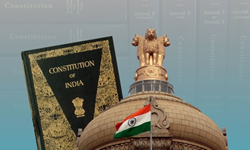

Context
- In a recent decision, the Supreme Court ruled that the government cannot claim immunity from the legal provisions of a contract entered into under the President's name under Article 299 of the Constitution.
What is the case?
- Glock Asia-Pacific Limited Vs Government of India: The case dealt with an application filed by Glock Asia-Pacific Limited, a pistol manufacturing company, against the Centre regarding the appointment of an arbitrator in a tender-related dispute.

What is the Constitution provision in this regard?
- Article 298: The article grants the Centre and the state governments the power to carry on trade or business, acquire, hold, and dispose of property, and make contracts for any purpose, while Article 299 delineates the manner in which these contracts will be concluded.
- Background: Articles 298 and 299 came after the Constitution came into effect and the government entered into contracts even in the pre-independence era.
- According to the Crown Proceedings Act of 1947, the Crown could not be sued in court for a contract it entered into.
- Article 299 of the Constitution: It provides that “all contracts made in the exercise of the executive power of the Union or of a State shall be expressed to be made by the President or by the Governor of the State” and that all such contracts and “assurances of property made in the exercise of that power shall be executed” on behalf of the President or the Governor by persons in a manner as directed and authorised by them.
- Under Article 299 (1) means that there must be a deed or contract in writing and that it should be executed by a person duly authorised by the President of the Governor on their behalf.
On what grounds did the court decide to hear the case?
- Arbitration and Conciliation Act, 1996: The act says that notwithstanding any prior agreement, any person whose relationship with the parties or counsel of the dispute falls under any of the categories in the Seventh Schedule will be ineligible to be appointed as an arbitrator.
- As per the Seventh Schedule of constitution: The Seventh Schedule includes relationships where the arbitrator is an employee, consultant, advisor, or has any other past or present business relationship with a party.
- Appointment of an Arbitrator: The 246th Law Commission Report, which dealt with the issue of contracts with government entities, the court observed that when the party appointing an arbitrator is the State, “the duty to appoint an impartial and independent adjudicator is even more onerous.”
- Thus, the court rejected the Centre’s reliance on Article 299, saying, “Article 299 only lays down the formality that is necessary to bind the government with contractual liability” and not “the substantial law relating to the contractual liability of the Government”, which is to be found in the general laws of the land.


